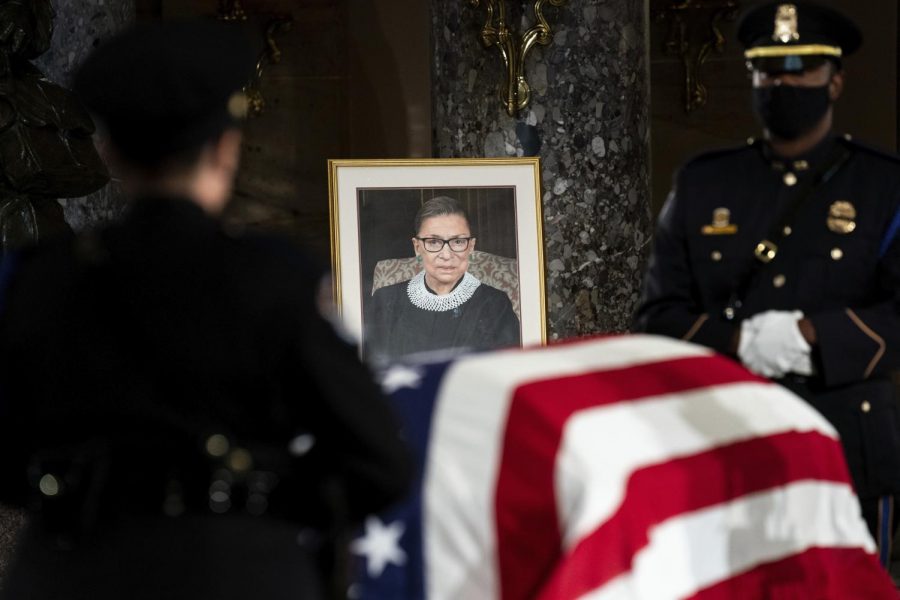Tending to RBG’s seeds in the face of her possible replacement
September 26, 2020
U.S. Representative Robin Kelly, a close ally to Lori Lightfoot, mayor of Chicago, attended a gathering in Chicago at federal plaza to mourn Former Associate Justice of the Supreme Court Ruth Bader Ginsburg.
She quoted the musical Hamilton in the speech she gave, according to the Chicago Tribune. Legacy is planting seeds in a garden you won’t get to see, Kelly said.
Ginsburg planted many seeds for women they may not be aware of — like being able to own a credit card without a husband signing off on it. Now more than ever women must water their seeds to grow the flows Ginsburg always intended to see.
Many women, like NIU educators, have taken this chance to fight like Ginsburg is watching and tend to their seeds to see a future they not only want for themselves, but for future women living in a world without Ginsburg.
Vote:
Ginsburg’s last wish when she passed away was for her spot in the supreme court not to be filled until elections took place, but President Donald Trump has nominated Amy Coney Barrett, 48, a devout Catholic mother of seven to fill her spot. Barrett is a favorite of religious conservatives and considered a strong opponent of abortion, according to CBC News.
“I’m really concerned about the possibility that the supreme court will mediate the election process and ultimately end up casting a decision in favor of a candidate,” Amanda Littauer Associate Professor, Department of History/Center for the Study of Women, Gender and Sexuality said.
If we end up with a brand new conservative judge who is hand picked by president trump could, that could promote America ending up with Trump for another four years, she said.
It’s important for women to go out and vote by mail or in person for the person they see fit for president to preserve Ginsburg’s changes in laws and women’s rights.
You can register to vote here. With the COVID-19 pandemic, voting by mail is an option. Illinois voters can also vote early starting Sept. 24, 2020 through November 2, 2020, but dates and hours may vary based on where you live. Click here to find locations.
Tikkun Olam:
Judaism emphasizes the significance of tikkun olam, meaning “healing the world” in Hebrew, Littauer said. As a Jewish woman like Ginsburg, she feels a sense of obligation to do work of healing.
Littauer has joined Together Rising’s 40 days of action program where they suggest one action a day leading up to elections for political involvement and voter registration. The program is a way for women to be able to hold their heads high regardless of election results because they took responsibility, she said.
“I will be an advocate for poor women, regardless of their class status, to have equal access and rights,” Dr. Kate Cady, Faculty Advisor for Women and Gender Advocacy Alliance, said
One of Ginsburg’s most monumental decisions in the supreme court was the decision of Roe vs. Wade, protecting a pregnant woman’s liberty to choose to have an abortion. If President Trump’s replacement assists in overturning Roe V. Wade, it will be a problem mainly for poor women, Cady said.
Mostly northeast states wont get rid of their state laws, giving women the right to choose. Wealthy women in southern states that don’t have the same laws can travel to states like Illinois and get an abortion. But less fortunate women don’t have the means to travel and will ultimately not have the same resources.
Turn to Planned Parenthood:
Since there’s a chance women could be stripped of their right to an abortion depending on the state they reside in, women can lean on Planned Parenthood to provide them information on access to an aboartion at a local level, including county, city and surrounding states.
Reach out to each other
Collaboration with one another on issues we care about and standing in solidarity together is crucial right now, Littauer said. A lot of women were inspired by Ginsburg, and now is the time to act like she’s watching and support one another.







